
Research by ISB faculty reveals an increase in uptake of rations, driven by improved service standards of ration shop owners
India’s Public Distribution System (PDS) is one of the largest food security programmes in the world, serving millions of households across the country. This programme distributes essential commodities such as rice, wheat and sugar to eligible households at subsidised rates through a network of government-run ration shops.
While the programme aims to ensure food security for economically disadvantaged households in India, it has numerous inefficiencies. Many of these inefficiencies arise from the requirement to collect grains from pre-assigned agents.
To address this issue, many states introduced intra-state portability as early as 2012, allowing households to collect their government-subsidised rations from any licensed ration shop within that state. It was believed this move would break the monopoly power of agents, providing convenient access to rations.
But merely providing choice of agent may not result in increased access to essential food items or improvement in welfare.
Our prior research and field interviews point to several operational challenges that reduce the impact of choice. We find there is a limited availability of alternative shops in sparsely populated areas. Even if alternative shops are available, agents are unable or unwilling to serve beneficiaries not assigned to them. Serving additional households requires ordering and stocking additional quantities of grains every month, which may not always be possible due to financial constraints, lack of storage space, or a clearly articulated stock replenishment policy.
Further, at the shop level, the introduction of portability gives rise to fluctuations in demand for rations. Agents fear they may run out of stocks if they serve new households not preassigned to them.
What were the findings of our current research?
Our analysis shows that the introduction of portability in Telangana in 2018 led to an increase in the uptake of rations. Specifically, about 600,000 additional households availed of rations after the introduction of portability in Telangana.
Put another way, prior to the introduction of portability, nearly 12% of rations in our sample were unclaimed. With the introduction of portability, this figure was nearly halved to 6%.
At the household level, access to subsidised rations has the potential to contribute to savings of Rs 600-700, which in many cases is nearly 20% of the average expenditure on food for the households.
What was the primary factor for the increase in uptake of rations?
Our research uncovered a surprising finding. It shows that ration shop owners improved their service standards by keeping their shop open for longer hours. Shop owners proactively facilitated easier access to rations fearing loss of households to nearby ration shops.
Thus, simply providing choice, even if it is not utilised, has the potential to improve welfare outcomes.
Extending beyond PDS in India, our research suggests that offering options and empowering households could be valuable in designing and implementing social assistance programmes.
Article based on the research paper: Technology-Enabled Agent Choice and Uptake of Social Assistance Programs: Evidence from India’s Food Security Program — by Rakesh Allu , Maya Ganesh, Sarang Deo, Sripad K Devalkar
[Click here to go to the full paper]
To read an article on how this policy change could play out for an individual household, click here

